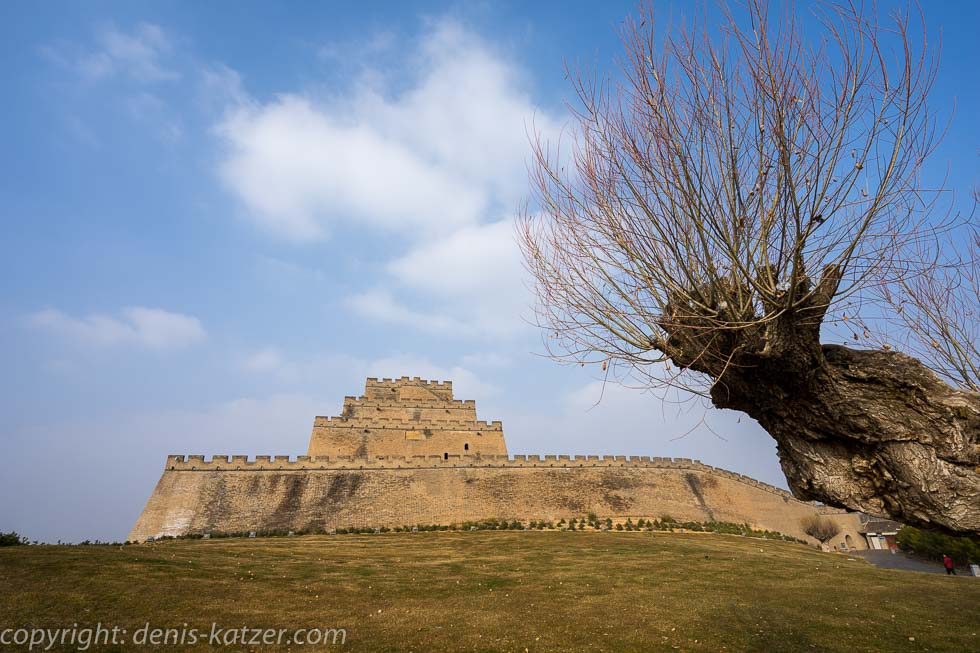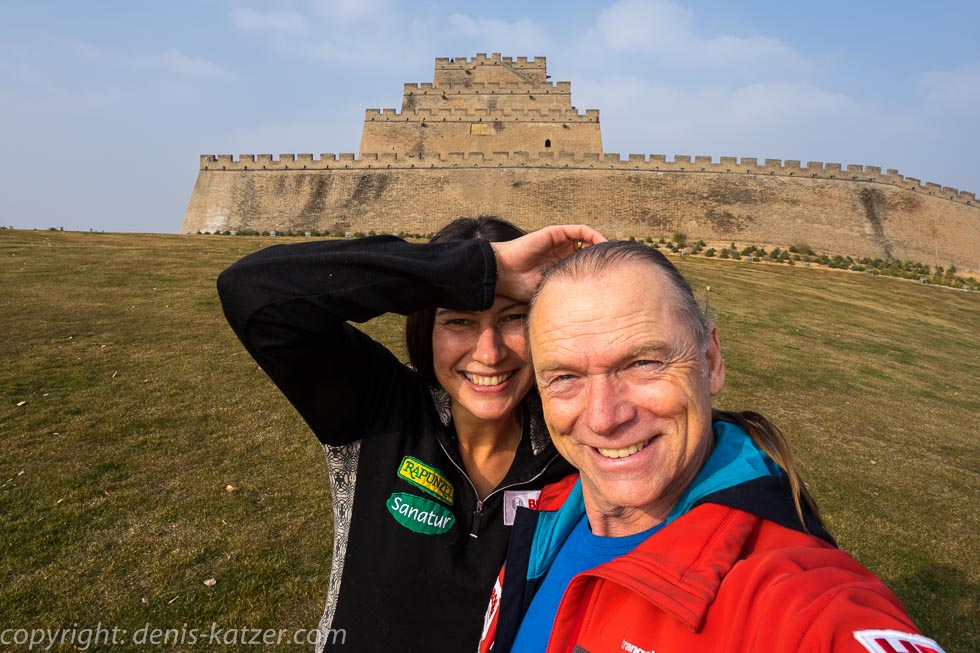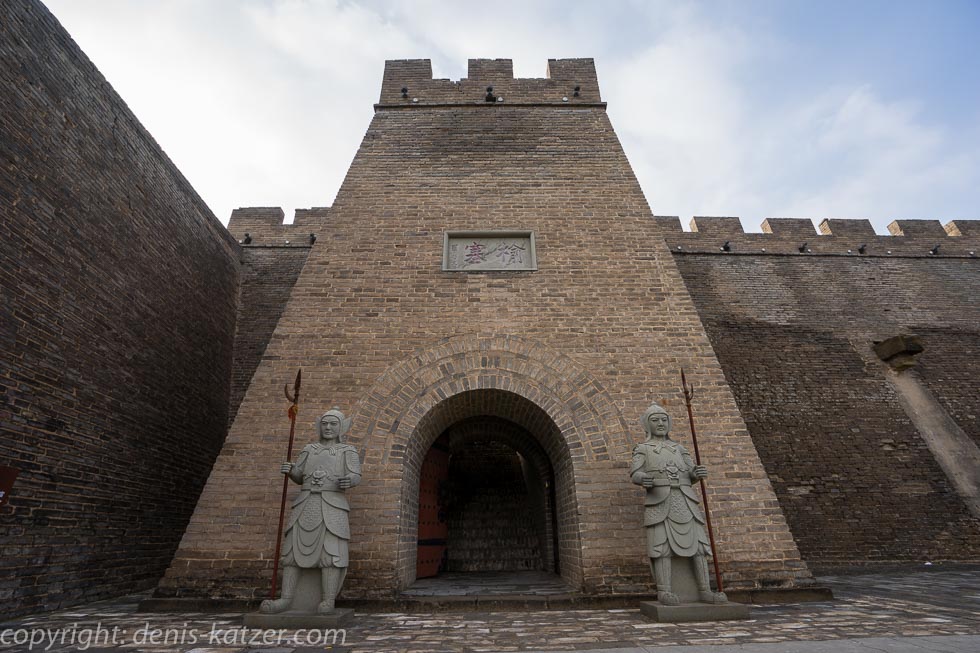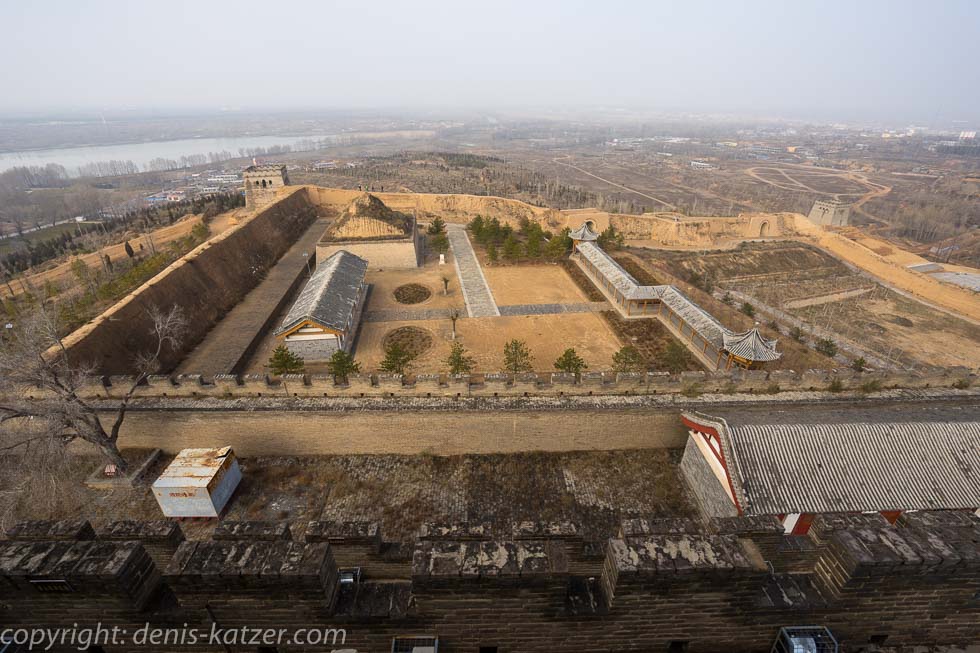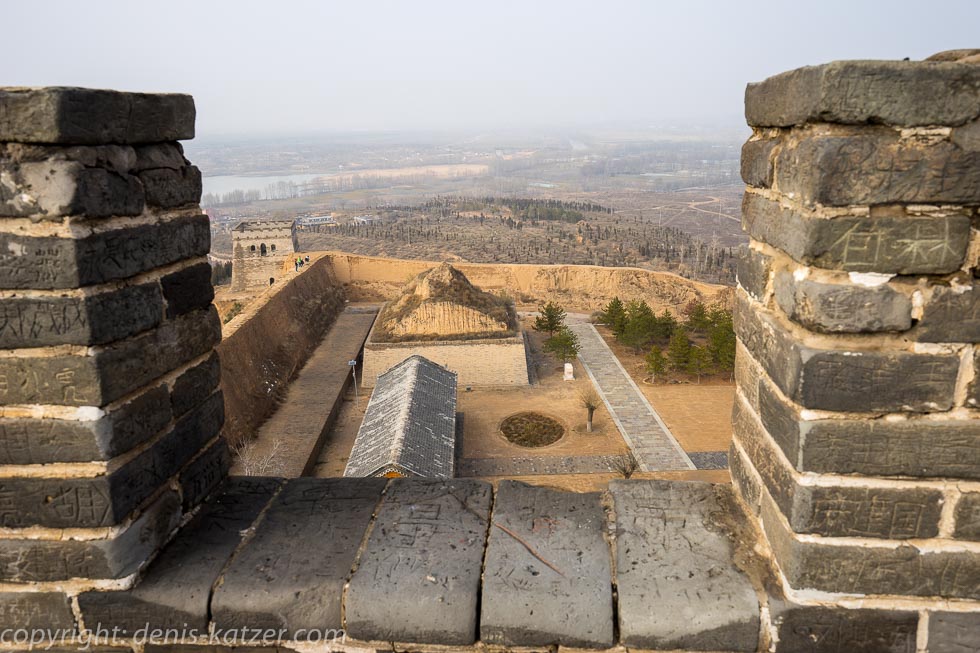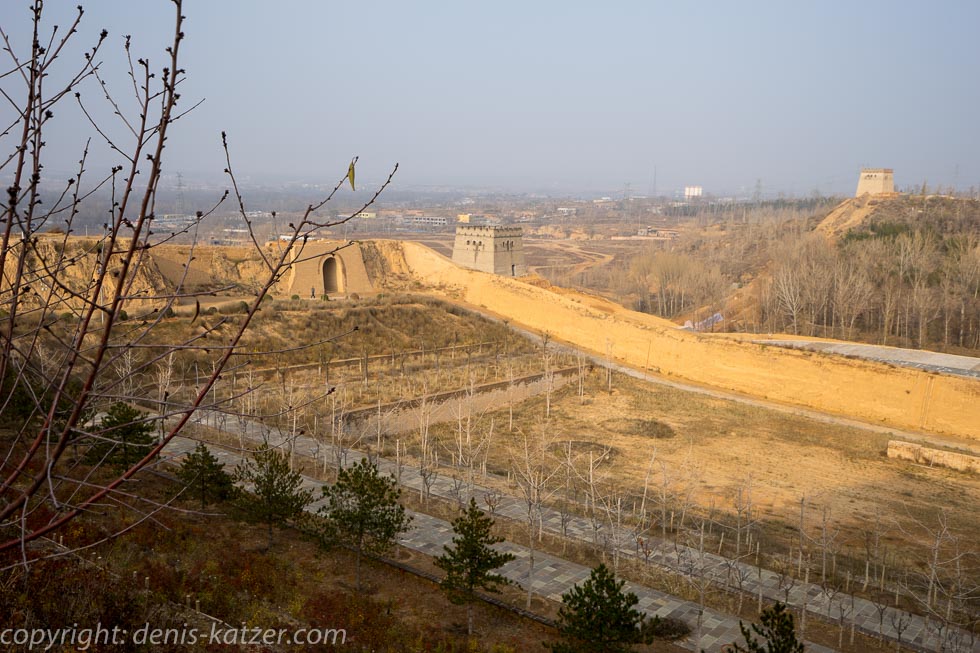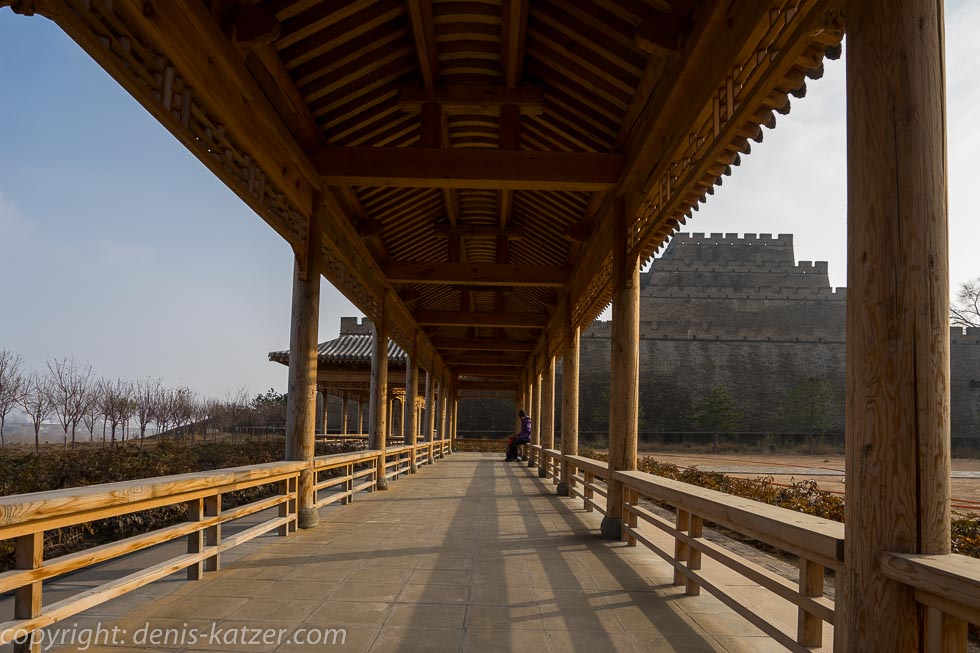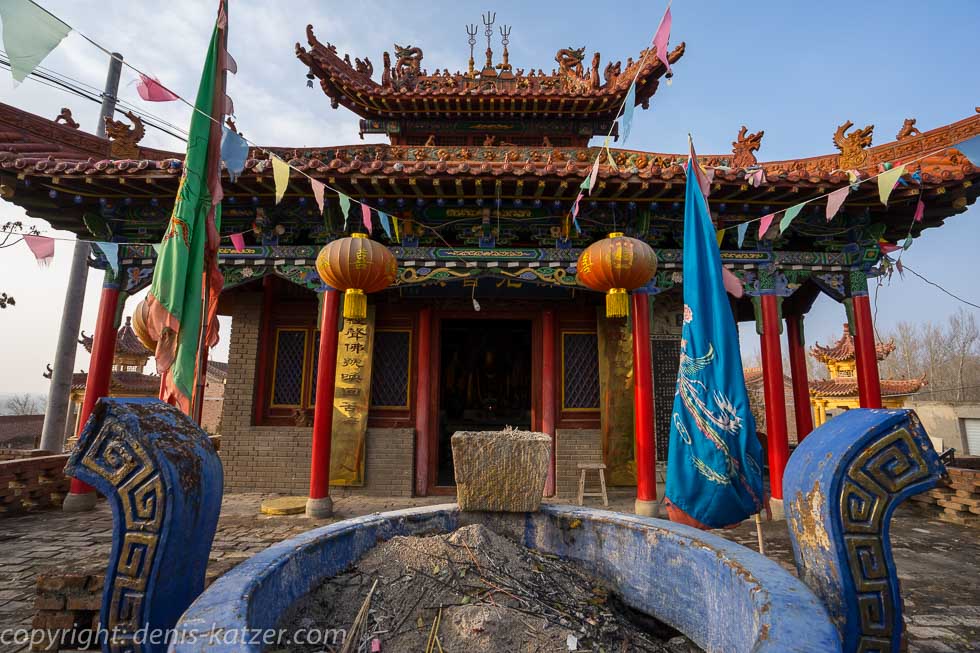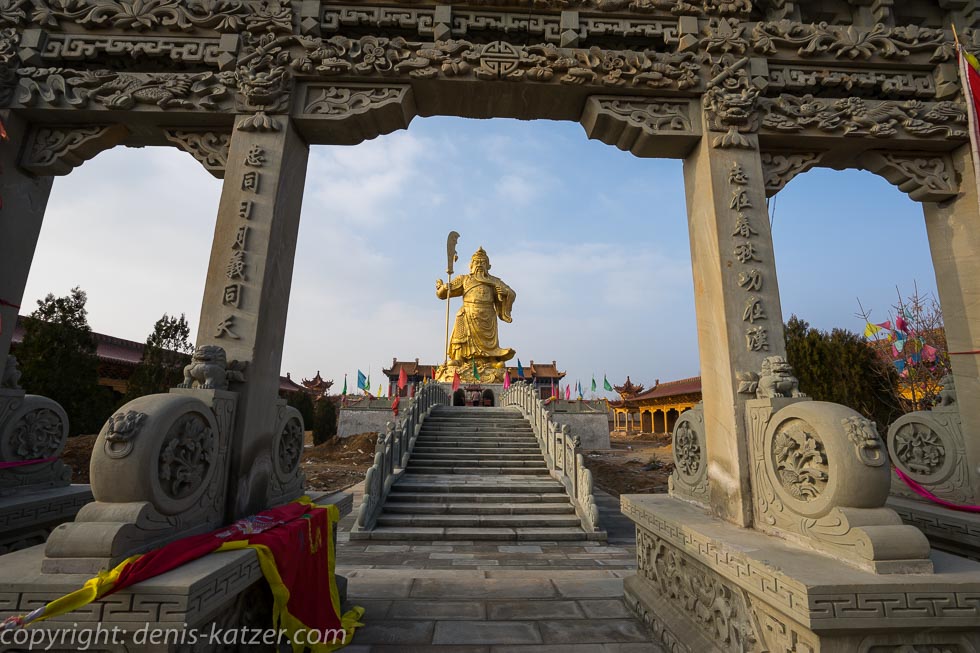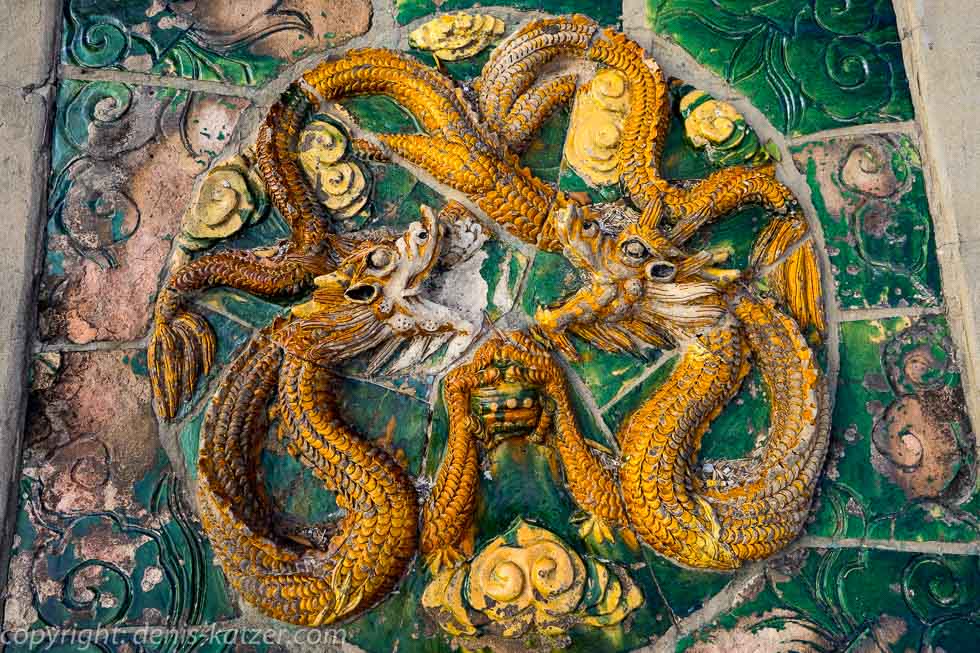
Life in the Hutong and an involuntary city tour
N 38°16'36.5'' E 109°43'11.3''
Date:
11.11.2015 until 15.11.2015
Day: 136-140
Country:
China
Province:
Shaanxi
Location:
Yulin
Latitude N:
38°16’36.5”
Longitude E:
109°43’11.3”
Total kilometers:
10,676 km
Maximum height:
1.038 m
Total altitude meters:
8.261 m
Sunrise:
07:16 am to 07:20 am
Sunset:
5:33 pm to 5:30 pm
Temperature day max:
12 °C
Temperature day min:
1 °C
(Photos of the diary entry can be found at the end of the text).
On the second day in our small room, the owner of the guest house hands us a parcel. “Thank you,” I say and open it hastily. “The new heavy-duty drawbar and the GPS have arrived!” I shout outside, because Tanja is in the courtyard of our hutong with Ajaci. “Great!” she gleefully storms into the room. “Then we can continue tomorrow?” “I don’t know. It doesn’t smell as bad now as it did at the beginning. First I have to fit the drawbar, replace the front brake pads on your bike, clean and oil the chains, make a barrier for Ajaci’s trailer so he can’t hang his paws out, get to grips with the new GPS and write a few updates. I think that’s enough stuff for a few more days.” “Okay, then we’ll stay. That’s fine with me. I still have some texts to translate and need to get to grips with Instagram. Apart from that, the WLAN here is quite useful,” Tanja replies.
It is always surprising how quickly you can adapt to a worse environment if you give yourself the time to do so. When we arrived here two days ago, I didn’t think I could stand a moment in this foul-smelling moldy castle, and now we’ve come to terms with the hutong. Since the owner has hung a thick blanket in front of the entrance door, it is no longer so cold in our room and the warm air from the air conditioning, combined with the burning of a few sage leaves, has taken away the pungent smell. The inner courtyard is also quiet. Here I can carry out all the repair work without being constantly watched by prying eyes. What I like most is that I don’t have to walk Ajaci through the cold, wet, dark alleys of Yulin at night, because there is a small 2 x 4 square meter area in our courtyard where he can pee. I only have to let him out briefly before going to bed and then I can quickly snuggle back into my bed.
On the fifth day, we decide to visit the Zhenbeitai watchtower, which was built in 1607. It once had great military significance and, like many watchtowers, was part of the Great Wall of China. Here, too, we are almost the only visitors at this time of year. We enjoy the privilege of being able to roam around undisturbed in such a cultural site of the Ming Dynasty. Standing at the top of the 96 m high tower, we look out over the city of Yulin with its 3.4 million inhabitants stretching out in the haze. The desert can be seen on the opposite side to the north. Artificially planted forests are being used to counteract the advance of the ever-expanding desert. Directly below us are the courtyards and walls of the former town of Kuangong. With a length of 210 m and a width of 175 m, it seems tiny, but 400 years ago Kuangong was an important trading center between the Mongol feudal lords and the emperor of the Ming Dynasty.
“On the way back to our hutong, we should take the bus,” Tanja suggests. “And you mean it will really take us to the right stop?” I ask a little uncertainly. “Sure, the guidebook says that bus no. 11 will take us to the city center.” “Okay, let’s just try it then,” I reply, getting on the bus that picks up its passengers below the Zhenbeitai watchtower. As route no. 11 has its terminus at the watchtower, we are the only ones getting on here, along with four other passengers. However, just a few stops further on, the passengers crowd together like sardines. “Surely the bus should have turned off here?” I ask Tanja. “Actually, yes,” she replies, shrugging her shoulders. I look at the houses and tower blocks flying by, marvel at the neon signs of the countless stores, department stores, stores and restaurants, look at the merciless traffic, the electric scooters whizzing by, the mopeds and loudly chugging three-wheeled motorcycles, whose stinking diesel fumes don’t bother us in here. “I don’t think the bus is going in the direction we want,” I say after 30 minutes. “I think so too,” is Tanja’s dry reply, who looks out of the window with just as much interest as I do. The bus crosses a few bridges and passes construction sites where workers are running back and forth like ants. We should turn right here, I think to myself, and am delighted when we actually turn right. Shortly afterwards, however, our vehicle turns left again, then right to turn left again and suddenly I have lost all sense of direction. “How much longer do we want to sit here?” I ask after 45 minutes. “What do you mean?” “Hm, it must have reached the other end of the city at some point. Maybe we should get off there and then take the next bus back?” “A good idea,” says Tanja. After 60 minutes, the bus gets emptier and emptier. Even the passengers who got on with us at the watchtower have left us. We are now driving through a kind of satellite town. One high-rise building follows another. Many of them under construction. The Mu-Us desert, which stretches from here to Inner Mongolia, blows its sand over protective walls. Fascinated by the fact that it carries its yellow sand so far into the city, I look at the sprawling areas bordered by modern buildings. Our bus turns right again into a lonely, wide street. We have been the last passengers for some time. “That seems to be the end of the line up ahead,” I say, pointing to a few other buses parked at the side of the road. The driver actually stops and takes the key out of the lock. “That was a nice city tour,” says Tanja. “Yes, and it was even incredibly cheap,” I reply with a laugh. When we show the driver the address of our hutong, he has to laugh. “Zhe liang gonggong qiche shi qu wang hui?” (Is this bus going back?), we want to know. “Bu, (no) you have to take another one,” we understand. “Which other one?” I ask Tanja, pointing to the lonely empty buses standing around. “We’ll just wait until one of the drivers arrives and get on,” she suggests. The sun is already setting while we stretch our legs and walk up and down in front of the little house where some of the bus drivers spend their final stop break. Finally, one of the men leaves the shabby hut. We follow in his footsteps. He actually gets on one of the buses. We show him the business card with the address. He promises to tell us which bus stop to get off at. 30 minutes later we are back in the city center. “Zher!”, (Here) says the bus driver and we get off. We wave a cab over and show it our business card. It takes a while. Then he calls our innkeeper and asks him to explain where he needs to go.
Famished and tired, we reach our inner courtyard. Because of the approaching cold, we put on a warmer jacket and walk to the restaurant where we have been eating for the last few days. Because there is no heating in there, we are shivering with cold. Each of the guests is wrapped up in warm winter clothes. I’m sitting with my back to a large aquarium, with fat fish gasping for air in the murky water. A circulation pump makes the water splash loudly behind my back. I would like to change tables, but unfortunately the restaurant is full. We place the order. It doesn’t take long and the waitress serves us our food. Hungry, I dip my chopsticks into the spiced tofu as the chef comes and pulls out one of the large fish with a net behind my back. But it doesn’t want to land in the wok and jumps out of the net in a high arc, turns a casual somersault, not without splashing me with the dirty water from which it has just been taken out, and lands with a loud splash at my feet. The chef doesn’t hesitate for long, grabs it by the gills, maneuvers the poor creature back into his net and disappears into the kitchen with his prey. I sit there like a watered poodle and wipe the water off my face and jacket. A few guests look at me a little sheepishly. As the water has not only hit me, but has also splashed over my food, I sit in front of it and don’t know at first whether it is advisable to continue with my meal. “We’ll order something else,” says Tanja. “Hm,” I think for a while. Then my hunger decides what to put the chopsticks back into the tofu…
The live coverage is supported by the companies Gesat GmbH: www.gesat.com and roda computer GmbH www.roda-computer.com The satellite telephone Explorer 300 from Gesat and the rugged notebook Pegasus RP9 from Roda are the pillars of the transmission.
